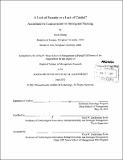A lack of security or a lack of capital? : acculturative conservatism in immigrant naming
Author(s)
Zhang, Jiayin
DownloadFull printable version (3.002Mb)
Alternative title
Acculturative conservatism in immigrant naming
Other Contributors
Sloan School of Management. Economic Sociology Program.
Advisor
Ezra W. Zuckerman Sivan.
Terms of use
Metadata
Show full item recordAbstract
Recent research on immigrant naming demonstrates a market tendency towards "acculturative conservatism," whereby immigrants select given names for their children that were highly popular in an earlier generation of the native population. Acculturative conservatism can potentially be explained as an attempt to address immigrants' feelings of insecurity by favoring cultural practices that most clearly convey the national identity. However, a more straightforward interpretation is that immigrants lack the necessary cultural capital to know which cultural practices are fashionable. In this paper, we first show that acculturative conservatism is a significant social force by examining how it lowered the rate of change in the fashion of given names between 1880 and 1920 in the United States. Second, we develop a novel analytic strategy to distinguish the effects of a lack of security and those of a lack of cultural capital. Our data include the English names of the early male children of Jewish immigrants who immigrated to America between 1880 and 1920, and the male names of the mainstream in the same period. By applying our analytic strategy, we find that Jewish immigrants tend to select among the formerly popular English names by favoring those whose popularity was still rising and to avoid those that were declining in the native population. This suggests that Jewish immigrants had considerable knowledge of the latest fashions, but deliberately chose older names that would convey their national identity more strongly and thereby address their feelings of insecurity.
Description
Thesis (S.M. in Management Research)--Massachusetts Institute of Technology, Sloan School of Management, 2013. Cataloged from PDF version of thesis. Includes bibliographical references (p. 26-28).
Date issued
2013Department
Sloan School of Management. Economic Sociology Program.; Sloan School of ManagementPublisher
Massachusetts Institute of Technology
Keywords
Sloan School of Management. Economic Sociology Program.